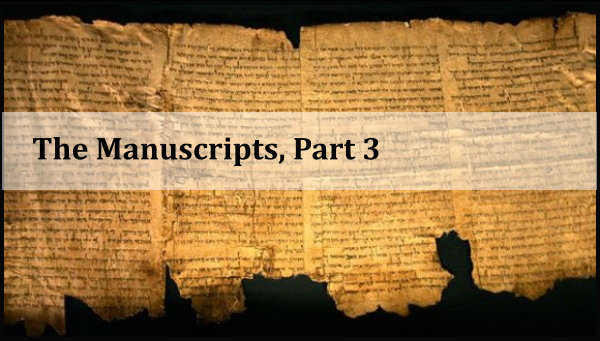By Tyson Thorne

If you read the NIV translation of the Bible you may have seen some notes attached to certain New Testament passages that state, “the earliest and most reliable translations do not contain verses…” In the NET translation you will simply notice missing verses with a footnote stating those verses do not appear in the earliest manuscripts so they have been omitted. I like the NIV’s approach better, but completely appreciate the purity of the NET editors. The question isn’t how translators handle these passages, however, the question is what’s going on with these verses and should they be included in the Bible at all.
There are three New Testament sections we’ll look at that may make some Christians uncomfortable. The first we’ll examine is Mark 16.9-20. This is the ending to the book of Mark, and none of it appears in the earliest manuscripts. At first it doesn’t appear to be anything significant; verses nine through 16 are basically a recap of events from Luke and Mathew. What makes this passage difficult for many is that verses 17 through 20 does impact certain beliefs about God’s responsibilities toward the church.
These signs will accompany those who believe: In my name they will drive out demons; they will speak in new languages; they will pick up snakes with their hands, and whatever poison they drink will not harm them; they will place their hands on the sick and they will be well.” After the Lord Jesus had spoken to them, he was taken up into heaven and sat down at the right hand of God. They went out and proclaimed everywhere, while the Lord worked with them and confirmed the word through the accompanying signs.
The passage promises that it will be normative for believers to be able to overcome snake venom and poison and will be empowered to heal the sick. Then it continues to proclaim theology that came later through Paul. In fact, the promises made are lifted directly from the ministry Paul conducted on his three missionary journeys. This leads many scholars to believe that this section was written later, after the New Testament had been canonized, and I think they are right. In fact, I’d like to suggest a nominee for the author of these verses.
Ariston of Pella (100-160 AD) was a Greek speaking Christian and a chronicler of history. He is the source of more well-known authors like Eusibius and Moses of Chorene and was likely the secretary of the first Gentile bishop of Jerusalem, a man named Mark. Because many may have been unhappy with the abrupt ending of the Gospel of Mark I believe he wrote these verses to satisfy the need to tie things together and to foreshadow events found in the book of Acts. While there is no direct link to his authoring these verses, the ending does appear during his time of influence and he had a knowledge of Greek, theology and Bible sufficient to write such a tight and satisfying ending.
If not for the promise of sign gifts being normative for modern believers, this passage would not impact Christianity in any way. But there are some sects, especially in the Appalachian Mountains, who integrate snake handling as part of their worship services based entirely on this passage. Since this is the only passage that makes such promises, and since it is called into question, all believer’s ought to evaluate these three points to determine if they are reliable enough to risk one’s life for. We at Think-Biblically.com believe the book of Mark rightly ends at 16.8 and that the sudden ending is in keeping with the hurried writing style of the author.
The other two passages that are often questioned are found in the Gospel of John, and we’ll examine them next time.
Continue to Part Four
|
|
